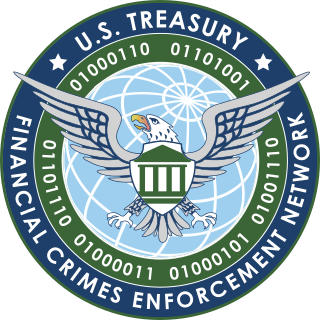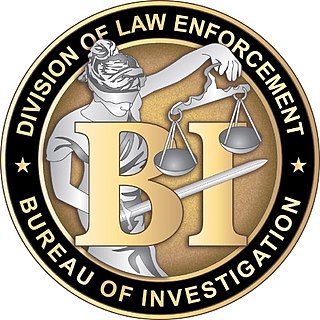
The Federal Bureau of Investigation (FBI) is the domestic intelligence and security service of the United States and its principal federal law enforcement agency. An agency of the United States Department of Justice, the FBI is a member of the U.S. Intelligence Community and reports to both the Attorney General and the Director of National Intelligence. A leading U.S. counterterrorism, counterintelligence, and criminal investigative organization, the FBI has jurisdiction over violations of more than 200 categories of federal crimes.

The Financial Crimes Enforcement Network (FinCEN) is a bureau within the United States Department of the Treasury that collects and analyzes information about financial transactions to combat domestic and international money laundering, terrorist financing, and other financial crimes.

The Australian Federal Police (AFP) is the national and principal federal law enforcement agency of the Australian Government with the unique role of investigating crime and protecting the national security of the Commonwealth of Australia. The AFP is an independent agency of the Attorney-General's Department and is responsible to the Attorney-General and accountable to the Parliament of Australia. As of October 2019 the Commissioner of the Australian Federal Police is Reece Kershaw, formerly the Northern Territory Police Commissioner.
In the United States, a special agent is an official title used to refer to certain investigators or detectives of federal, military, tribal, or state agencies who primarily serve in criminal investigatory positions. Additionally, some special agents operate in criminal intelligence, counterterrorism, or counterintelligence-based roles as well, with one or all of these roles occasionally taking precedence over criminal investigatory tasks.
A state bureau of investigation (SBI) is a state-level detective agency in the United States. They are plainclothes agencies which usually investigate criminal cases involving the state and/or multiple jurisdictions. They also typically provide technical support to local agencies in the form of laboratory and/or record services, or to directly assist in the investigation of cases at the local agency's request.

In the United States, a gun show is an event where promoters generally rent large public venues and then rent tables for display areas for dealers of guns and related items, and charge admission for buyers. The majority of guns for sale at gun shows are modern sporting firearms. Approximately 5,000 gun shows occur annually in the United States.

The National Crime Information Center (NCIC) is the United States' central database for tracking crime-related information. The NCIC has been an information sharing tool since 1967. It is maintained by the Criminal Justice Information Services Division (CJIS) of the Federal Bureau of Investigation (FBI) and is interlinked with federal, tribal, state, and local agencies and offices.

The National Security Branch (NSB) is a service within the Federal Bureau of Investigation. The NSB is responsible for protecting the United States from weapons of mass destruction, acts of terrorism, and foreign intelligence operations and espionage. The NSB accomplishes its mission by investigating national security threats, providing information and analysis to other law enforcement agencies, and developing capabilities to keep the US nation secure.
Crime in Washington, D.C., is directly related to the city's demographics, geography, and unique criminal justice system. The District's population reached a peak of 802,178 in 1950. Shortly after that, the city began losing residents, and by 1980 Washington had lost one-quarter of its population. The population loss to the suburbs also created a new demographic pattern, which divided affluent neighborhoods west of Rock Creek Park from the less well-off neighborhoods to the east.
The Australian Intelligence Community (AIC) and the National Intelligence Community (NIC) or National Security Community of the Australian Government are the collectives of statutory intelligence agencies, policy departments, and other government agencies concerned with protecting and advancing the national security and national interests of the Commonwealth of Australia. The intelligence and security agencies of the Australian Government have evolved since the Second World War and the Cold War and saw transformation and expansion during the Global War on Terrorism with military deployments in Afghanistan, Iraq and against ISIS in Syria. Key international and national security issues for the Australian Intelligence Community include terrorism and violent extremism, cybersecurity, transnational crime, the rise of China, and Pacific regional security.

The Federal Criminal Police Office of Germany is the federal investigative police agency of Germany, directly subordinated to the Federal Ministry of the Interior. It is headquartered in Wiesbaden, Hesse, and maintains major branch offices in Berlin and Meckenheim near Bonn. It has been headed by Holger Münch since December 2014.

The Organized Crime Drug Enforcement Task Force (OCDETF) is a federal drug enforcement program in the United States, overseen by the Attorney General and the Department of Justice. The principal mission of the OCDETF program is to identify, disrupt, and dismantle the major drug trafficking operations and tackle related crimes, such as money laundering, tax and weapon violations, and violent crime, and prosecute those primarily responsible for the nation's drug supply.

The Oklahoma State Bureau of Investigation (OSBI) is an independent state law enforcement agency of the government of Oklahoma. The OSBI assists the county sheriff offices and city police departments of the state, and is the primary investigative agency of the state government. OSBI works independent of the Oklahoma Department of Public Safety to investigate criminal law violations within the state at the request of statutory authorized requesters. The OSBI was created in 1925 during the term of Governor Martin E. Trapp.

The United States Organized Crime Strike Force (Strike Forces) is a program of the United States Department of Justice Criminal Division empowering individual and coordinated units based in American cities across the country to pursue illegal racketeering by organized crime syndicates, including the Mafia, Gangs, the Irish Mob, the Russian mafia, and more. The Strike Forces have largely been eliminated since Attorney General Dick Thornburgh in 1989 merged the Strike Forces with the AUSAs, in what was called the "slow death" of the effort against organized crime. Other Strike Forces have been merged with the Strike Forces of the Organized Crime Drug Enforcement Task Force (OCDETF), losing the focus of racketeering to focus on drugs and narcotics.

The California Department of Justice is a statewide investigative law enforcement agency and legal department of the California executive branch under the elected leadership of the Attorney General of California (AG) which carries out complex criminal and civil investigations, prosecutions, and other legal services throughout the US State of California. The department is equivalent to the state bureaus of investigation in other states.

Violent Crime Impact Teams (VCIT) in the United States work proactively to identify, disrupt, arrest and prosecute the most violent criminals through innovative technology, analytical investigative resources and an integrated federal, state and local law enforcement strategy along with the leading federal law enforcement agency for the VCIT, the Bureau of Alcohol, Tobacco, Firearms and Explosives (ATF).

The California Bureau of Investigation is California's statewide criminal investigative bureau under the California Department of Justice, in the Division of Law Enforcement (DLE), administered by the Office of the State Attorney General that provides expert investigative services to assist local, state, tribal, and federal agencies in major criminal investigations ranging across the state.

The Organized Crime & Racketeering Section (OCRS) supervised efforts of the United States Department of Justice Criminal Division against organized crime, and oversaw enforcement of statutes often associated with racketeering activities, disrupting the income base for crime syndicates. OCRS had specific supervisory authority over the "extortionate credit provisions" of the Consumer Credit Protection Act of 1968, the Gambling Devices Act of 1962, the Organized Crime Control Act of 1970 and other laws relating to gambling, extortion, bribery, racketeering and liquor control. OCRS was a section of the United States Department of Justice Criminal Division until its split and merger in 2010 into the Violent Crime and Racketeering Section (VCRS) and the Organized Crime and Gang Section (OCGS).

The Violent Crime and Racketeering Section (VCRS) is a section of the United States Department of Justice Criminal Division created in 2010. VCRS is a group of trial lawyers and prosecutors that develop ways to eradicate significant regional, national, and international organized crime groups and violent gangs. The prosecutors of VCRS are considered "the nation’s foremost experts in racketeering prosecutions." VCRS prosecutes cases brought to it by the Criminal Division, various federal agencies, including the DEA, the ATF, among others. VCRS works alongside prosecutors from the United States Attorney's Office in the Violent Crime Initiative.













